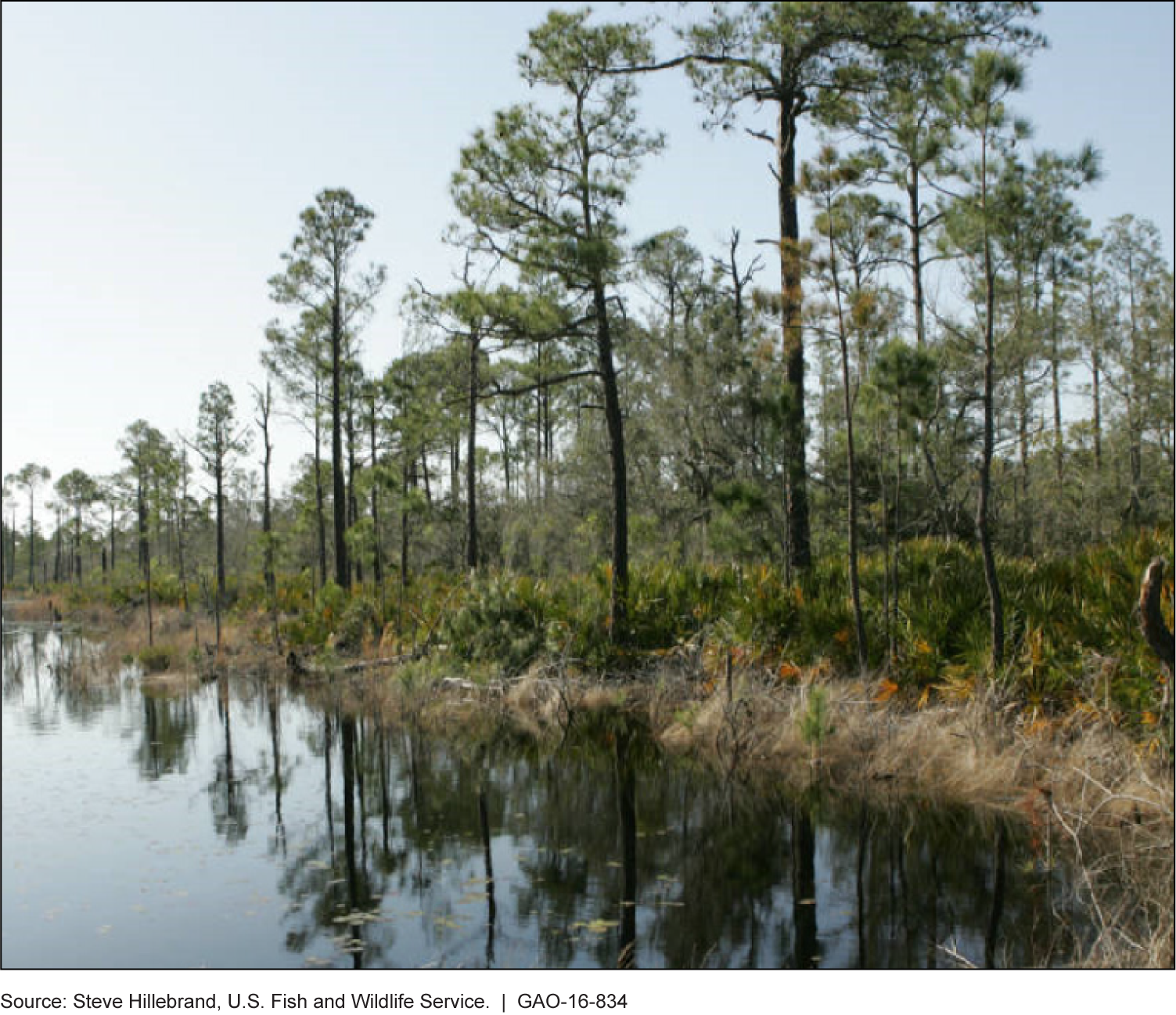Climate Change: Information on NOAA's Support for States' Marine Coastal Ecosystem Resilience Efforts
Fast Facts
Climate assessments predict that floods and other extreme weather events will become more common and intense, putting coastal areas—which are home to more than half of the U.S. population—at risk. The wetlands, marshes, and mangroves that usually help protect coastal communities are also vulnerable.
The National Oceanic and Atmospheric Administration provides funding, training, and other assistance to help states assess and prepare their coastal zones for sea-level rise and other effects of climate change. We surveyed the coastal managers in the 23 states with such coastal zones and found that they're generally satisfied with NOAA's support.
Forested Wetland

Photo showing trees and shrubs lining the water's edge
Highlights
What GAO Found
The Department of Commerce's National Oceanic and Atmospheric Administration (NOAA) is taking a variety of actions to support states' efforts to make their marine coastal ecosystems more resilient to climate change, and states generally view NOAA's actions as positive steps. The Coastal Zone Management Act (CZMA) provides a foundation for managing these ecosystems and partnering with states to work towards the agency's goals of achieving resilient coastal communities and healthy coastal ecosystems, according to NOAA officials. Through the federal-state partnership established under the CZMA, GAO found that NOAA has taken actions, including:
- Financial incentives. NOAA has targeted some of its financial incentives for activities aimed at addressing the impacts of climate change. For example, NOAA designated coastal hazards—physical threats to life and property, such as sea level rise—as the focus of CZMA competitive grants. States competed for a total of $1.5 million in grants in fiscal year 2016. Officials from all 25 state programs that GAO interviewed said funding provided by NOAA has been critical for planning projects related to ecosystem resilience, but also expressed concern that the amount of funding is insufficient to address states' needs in implementing projects. For instance, officials from 15 state programs further indicated that coastal zone management grants have been a primary source of funding from NOAA, but that they generally cannot be used to purchase land or for construction projects, activities states identified as important for improving coastal resilience.
- Technical assistance. NOAA has provided assistance largely through technical information, guidance, and training to help states better understand and address the potential impacts of climate change on marine coastal ecosystems. For example, NOAA helped develop an interactive digital tool to simulate different sea level rise scenarios. NOAA also developed guidance to help identify ways ecosystems may be used to enhance the resilience of coastal areas, such as using natural shorelines to buffer the effects of erosion. In addition, NOAA developed training on topics such assessing the vulnerability of coastal areas. State managers GAO interviewed had generally positive views of the technical assistance provided by NOAA. For example, officials from all 25 state programs said that the technical information NOAA provides has generally helped them incorporate climate information into their state programs.
- National Estuarine Research Reserve System. NOAA, in partnership with coastal states, manages 25 marine-based estuary reserves, in part, to study natural and man-made changes to estuaries (bodies of water usually found where rivers meet the sea), including the potential impacts of climate change. For example, in 2014, one state used its research reserve to study and map marsh migration patterns across the state's coastline to determine how these ecosystems may respond to rising sea levels. Officials from 19 of the 25 state programs said that work carried out through the research reserves plays an important role in furthering their understanding of how climate change may affect the structure and function of estuarine ecosystems.
Why GAO Did This Study
Coastal areas—home to over half of the U.S. population—are increasingly vulnerable to catastrophic damage from floods and other extreme weather events that are expected to become more common and intense, according to the 2014 Third National Climate Assessment. This assessment further indicated that less acute effects from changes in the climate, including sea level rise, could also have significant long-term impacts on the people and property along coastal states. Marine coastal ecosystems—including wetlands and marshes—can play an important role in strengthening coastal communities' resilience to the impacts of climate change, such as protecting eroding shorelines from sea level rise. Under the CZMA, NOAA is responsible for administering a federal-state partnership that encourages states to balance development with the protection of coastal areas in exchange for federal financial assistance and other incentives.
GAO was asked to review federal efforts to adapt to potential climate change effects on coastal ecosystems. This report provides information about NOAA's actions to support states' efforts to make marine coastal ecosystems more resilient to the impacts of climate change and states' views of those actions. GAO reviewed the CZMA and relevant NOAA policies and guidance; interviewed officials from NOAA headquarters and six regional offices; and conducted structured interviews with officials from the 25 state coastal zone management programs in all 23 marine coastal states.
NOAA provided technical comments on this report.
For more information, contact Anne-Marie Fennell at (202) 512-3841 or fennella@gao.gov.
